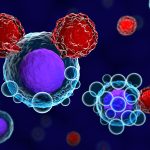-
March 29: The Week in Cancer News
Survival rates have increased for older AML patients who receive stem cell transplants, and cervical cancer diagnoses rise among women living in low-income counties.
by Kevin McLaughlin
-
March 22: The Week in Cancer News
First CAR T-cell therapy approval in chronic lymphocytic leukemia, and Environmental Protection Agency announces a complete ban on asbestos use in manufacturing.
by Thomas Celona
-
March 15: The Week in Cancer News
Modified CAR T-cell therapy shows promise in glioblastoma, and an immunotherapy may soon be available as an injection.
by Eric Fitzsimmons
-
March 8: The Week in Cancer News
Why do many Asian American women who have never smoked have lung cancer, and a report finds acne products can create cancer-causing benzine.
by Marci A. Landsmann
-
March 1: The Week in Cancer News
Many women must make decisions about preserving fertility while dealing with a cancer diagnosis, and head and neck cancer survivors face a higher stroke risk.
by Kevin McLaughlin
-
February 23: The Week in Cancer News
Melanoma drug becomes first cell therapy approved to treat a solid tumor, and a new method for treating mesothelioma extended patient survival in a recent trial.
by Thomas Celona
-
February 16: The Week in Cancer News
Researchers explore a try-everything approach to precision medicine, and physical activity may help ease cancer pain.
by Kevin McLaughlin
-
February 9: The Week in Cancer News
Patients and doctors urge researchers to study lower doses for cancer treatments, and the FDA faces criticism for not issuing a formaldehyde ban in hair straighteners.
by Marci A. Landsmann
-
February 2: The Week in Cancer News
Improving fitness linked to lower prostate cancer risk, and a study from Scotland finds no cervical cancer cases in women vaccinated before age 14.
by Eric Fitzsimmons
-
January 26: The Week in Cancer News
Questions about screening for women with dense breast tissue, and the FDA asks drugmakers to add a warning to labels for CAR T-cell therapies.
by Thomas Celona
Cancer Talk
Treatment Combination Improves Survival in EGFR-positive Lung Cancer
Adding chemotherapy to targeted therapy improves outcomes for people with advanced EGFR-positive non-small cell lung cancer.
by Sandra Gordon
Lessons From 20 Years Living With CancerMultiple myeloma survivor Jonathan Gluck reflects on uncertainty, and the scientific progress that has kept him living with cancer for more than two decades.
by Eric Fitzsimmons
The Enduring Importance of Cancer Disparities ResearchOpening session from AACR conference highlights how perseverance and adversity have informed cancer disparities research over the years.
by Eric Fitzsimmons
Most Cancer Survivors Don’t Meet Healthy Diet GoalsDespite research linking fruits and vegetables to cancer survival, many people do not change their eating habits after diagnosis.
by Darlene Dobkowski














